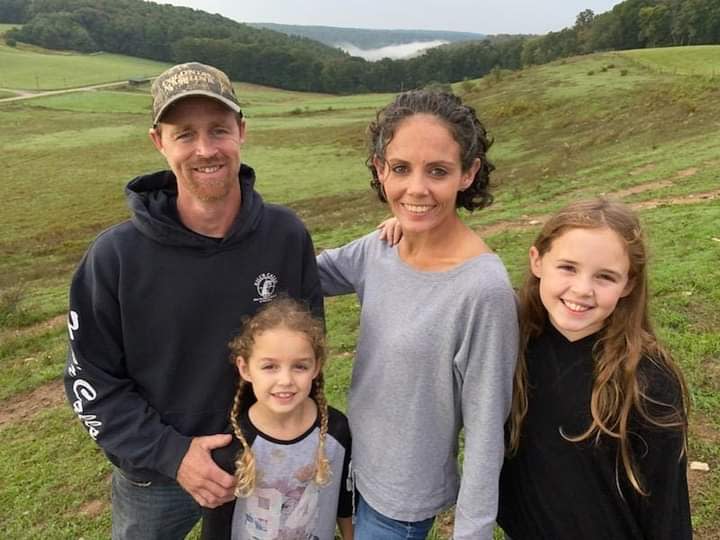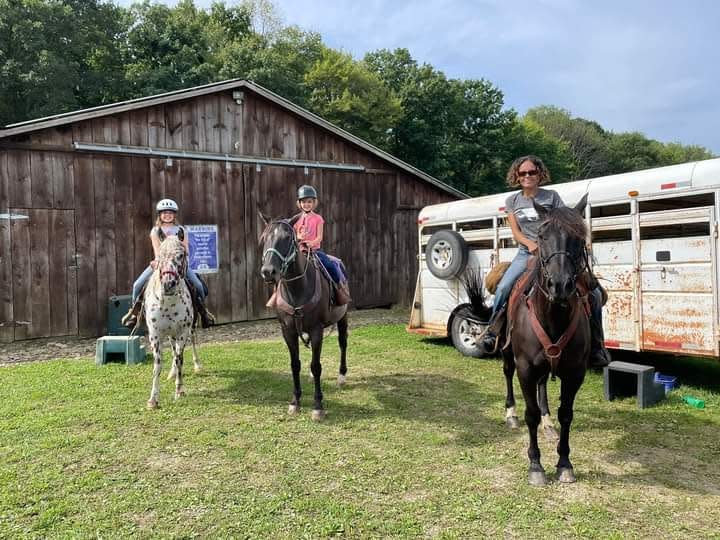Parkinson’s arrived in her 20s. Now, she's thankful for a procedure she was once scared of.
A previous version of this story incorrectly named the surgeon who performed the surgery. The doctor who performed the surgery is Dr. Andre Machado.
Nicole LaBolle was in her 20s when she developed a tremor in her right hand.
She was pregnant with her first child and as her pregnancy progressed, the tremor worsened. Once she gave birth, she couldn’t even use her right arm.
“Nobody thought it was Parkinson's because of my age,” said LaBolle, adding that by her 28th birthday she had been diagnosed with the disease.
LaBolle reflected on her journey as a young person with Parkinson’s Disease in honor of Parkinson's Awareness Month.
She’s now 39 and living in Pleasantville, Pennsylvania, about 2 ½ hours from Cleveland, where she underwent a procedure that has drastically improved her quality of life.

A pacemaker for the brain
Dr. Andre Machado performed the surgery, called deep brain stimulation, at the Cleveland Clinic in November of 2022.
Dr. Kristin Appleby is also a neurologist at the Cleveland Clinic who has treated LaBolle. She said deep brain stimulation is like a pacemaker for the brain.
“It basically involves drilling a hole in the skull and advancing a wire,” she said. “The tip of that wire delivers electrical stimulation to a very specific part of the brain that makes those degenerating brain cells work more like they should.”
She stressed that it doesn’t slow the progression of the disease but it treats the tremor patients experience, as well as slow movement.
Parkinson’s Disease is a disease caused by genetic degeneration of brain cells for about 10-15% of people who have it. For others who have the disease, the cause is unknown, Appleby said.
That average age of onset for Parkinson's is in an individual’s early 60s.
“Obviously, Nicole is very young and younger than average,” Appleby said, adding that symptoms for Parkinson’s include tremor, resistance when moving one’s arms and legs, and sometimes anxiety, depression, sleep disorders, constipation and more.
Woman with Parkinson’s at 28 recalls comparing symptoms with man she cared for
LaBolle’s tremor dates back to her early 20s. It would come and go, she said. She attributed it to the three jobs she worked at the time.
“I would blame it on caffeine or something, or say ‘I need to eat,’” she said. “I also smoked cigarettes, drank … the whole nine yards because I'm 20 and had no kids.”
When she got pregnant and quit everything, the tremor got worse.
LaBolle took care of an elderly couple for five years before her diagnosis and told USA TODAY that she noticed similarities between herself and the patient she cared for, who had Parkinson’s.
Her tremor would cause her to shake like her patient did. When she initially saw doctors in Pennsylvania, they thought it was a pinched nerve or a mental issue.
But the tremor continued and she was diagnosed with Parkinson’s in October of 2015.
LaBolle saw a series of doctors before ending up at the Cleveland Clinic. She said her previous doctors didn’t quite hit the mark and left her feeling like she didn’t have many treatment options.
One doctor LaBolle saw previously “didn’t understand that I was in my 20s,” she said. “I want to live my life. I’ve got two babies at home. What am I supposed to do? There were times where I could do nothing but sit down and sit on my hands just to hold still. I couldn't zip my own coat or tie my kids’ shoes. They had to tie my shoes.”
Procedure was intimidating, but 'I just knew I couldn't go on like that'
People had been telling LaBolle about the deep brain stimulation procedure for years but she always said no.
“Brain surgery was the last thing I wanted,” she recalled.
A doctor in Pennsylvania wanted her to participate in a trial involving stem cell research. She was looking forward it, but COVID and other factors made it impossible for her to participate.
She was so crushed that by the time she sought treatment at the Cleveland Clinic and doctors suggested deep brain stimulation surgery, she had one answer: “I'm ready.”
“I was at that point where I would try anything to change my life,” she said. “It wasn't scary to me anymore … I just knew I couldn't go on like that another year.”
Deep brain stimulation, the procedure she underwent, was approved by the U.S. Food and Drug Administration in 1997 to treat Parkinson’s tremor, according to the Parkinson's Foundation.
The surgery does not fully resolve Parkinson's symptoms, according to Johns Hopkins Medicine. However, it can decrease a patient’s need for medications and improve their quality of life.
According to Johns Hopkins, doctors typically recommend the surgery for:
Patients who have uncontrollable tremors and whose medications have not worked
Patients whose symptoms respond well to medications but experience severe motor fluctuations once the medications wear off
Patients whose movement symptoms may respond to higher or more frequent medication doses but who are limited because of side effects
Life after deep brain stimulation surgery
Her family is outdoorsy and the surgery has allowed her to do more with her husband and their two daughters, 11-year-old Willa and 8-year-old Fawn.
“I still have Parkinson's,” she cautioned. “I don't walk normally. I'm a little stiff. I talk a little differently … But I’m better now than my kids have ever seen. My husband, we've been together 19 years and he hasn't seen me this good for 10.”
She can shower when she wants. She can get herself dressed. She can cook dinner and braid her daughters’ hair.
The surgery made walking much easier for her and she can ride horses again, which she has always loved doing.

LaBolle wants to be an advocate for those with Parkinson’s Disease because so many people are misdiagnosed like she was initially.
“I had a doctor actually tell me it was mental,” she said. “I’m like ‘I have a baby at home. I don’t want to be like this. You can’t tell me it’s mental and throw me out the door.’”
She also hosts a poker run each year with her family to raise money for Parkinson's research and said she is grateful for the deep brain stimulation she underwent.
“I am so blessed to have a second chance in life,” she said. “It changed my life. It changed my whole entire family's life.”
Saleen Martin is a reporter on USA TODAY's NOW team. She is from Norfolk, Virginia – the 757. Follow her on Twitter at @SaleenMartin or email her at sdmartin@usatoday.com.
This article originally appeared on USA TODAY: Mom with early Parkinson's diagnosis recounts deep brain stimulation

